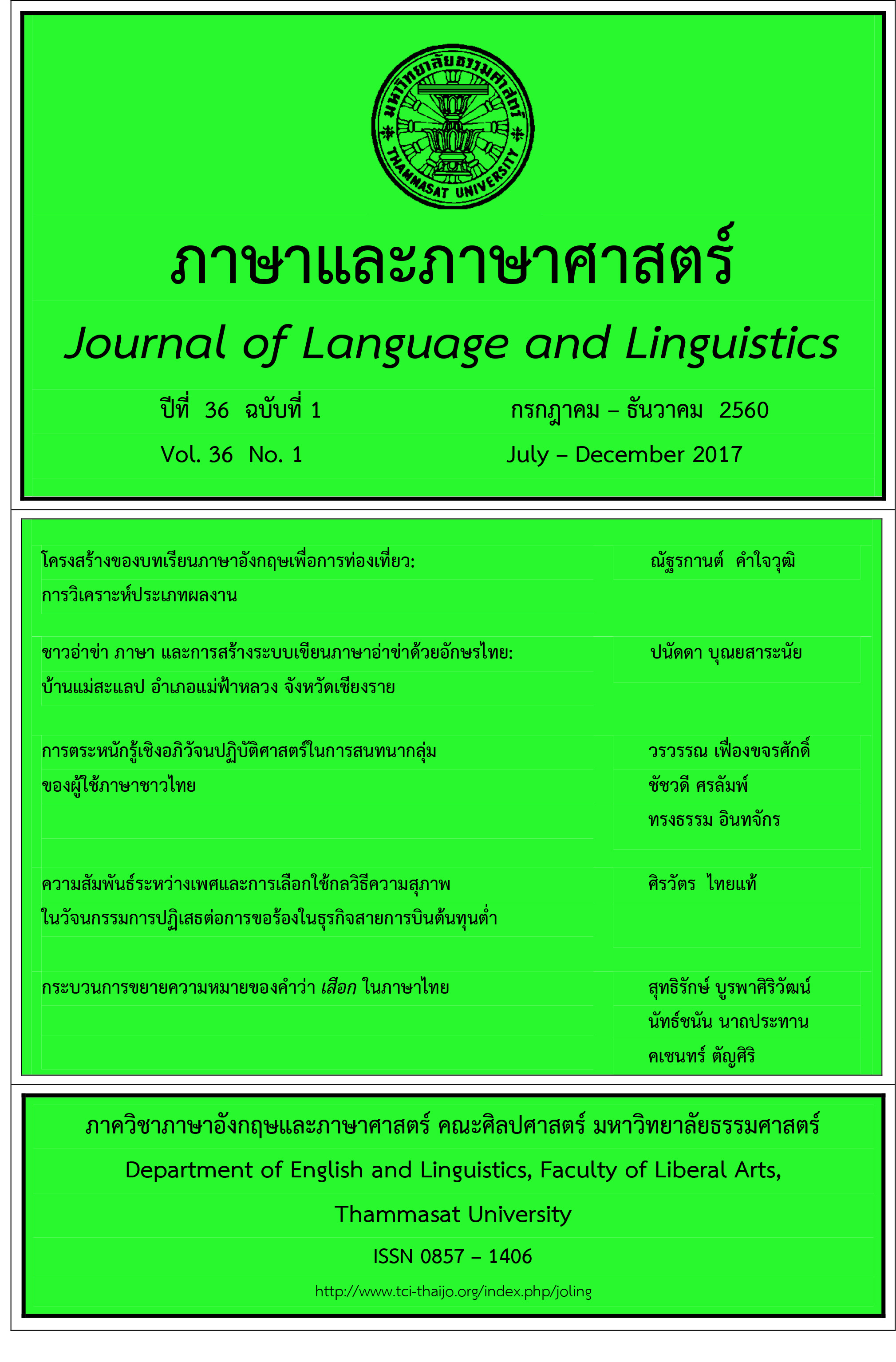The Rhetorical Structure of English for Tourism Lessons: A genre analysis approach
Main Article Content
Abstract
This study aims to investigate the structural organization of lessons in English for tourism textbooks used in Thai higher education using the genre analysis approach to discourse analysis. The approach is investigates communicative purposes of a text as a necessary criterion for defining its rhetorical structure (moves-steps) based on the work of Swales (1990, 2004). The texts selected in this study are 50 lessons to analyze the moves and steps; the frequency of occurrence shows the indispensable moves in each text within this discourse community. The moves and steps are classified into 3 categories: obligatory conventional and optional. It was found that the structural organization revealed 5 moves. Move 1: setting
up lesson and Move 2: vocabulary study were conventional; Move 3: explanation of language and/or structural grammar was optional; Move 4: practice was obligatory and Move 5: production was conventional. All 5 moves found had different steps to support their functions.
Article Details
บทความทุกบทความเป็นลิขสิทธิ์ของภาษาและภาษาศาสตร์
References
คณะครุศาสตร์มหาวิทยาลัยราชภัฏยะลา.
จักรพรรดิ คงนะ. (2550). การพัฒนาแบบฝึกการอ่านภาษาอังกฤษที่เกี่ยวกับปัญหาของวัยรุ่นตอนต้น สำหรับผู้เรียน ชั้นประถมศึกษาปี ที่ 6 โรงเรียนหลวงพ่อแช่มวัดตาก้องอนุสรณ์ จังหวัดนครปฐม.
ศึกษาศาสตรมหาบัณฑิต มหาวิทยาลัยศิลปากร.
พิมพาภรณ์ สุวัตถิกุล. (2546). การสื่อสารระหว่างวัฒนธรรม: ปัจจัยเพื่อการพัฒนาและส่งเสริมการท่องเที่ยว. สถาบันภาษา มหาวิทยาลัยสงขลานครินทร์ วิทยาเขตภูเก็ต.
ยุพาพร คูเวนเบิร์ก. (2554). การสร้างบทเรียนภาษาอังกฤษเพื่อการท่องเที่ยวในท้องถิ่นส าหรับนักศึกษา หลักสูตร ประกาศนียบัตรวิชาชีพ ชั้น ปีที่ 3 วิทยาลัยการอาชีพชุมแพ จังหวัดขอนแก่น.
ศิลปศาสตรมหาบัณฑิต สาขาวิชาภาษาอังกฤษ. มหาวิทยาลัยราชภัฏเลย
วิสาข์ จัติวัตร์. (2543). การสอนอ่านภาษาอังกฤษ. กรุงเทพฯ : คณะศึกษาศาสตร์ มหาวิทยาลัยศิลปากร
สุภาวดี วรภัทรกิจ. (2549). การพัฒนาบทเรียนภาษาอังกฤษเพื่อการท่องเที่ยวโดยใช้การเรียนแบบมุ่งปฎิบัติงาน. ศึกษาศาสตรมหาบัณฑิต สาขาวิชาการสอนภาษาอังกฤษ มหาวิทยาลัยเชียงใหม่.
Brown, Douglas. H. (2007). Principle of Language Learning and Teaching. (5th ed.). New York: Longman
Dudley-Evans, A. and St.John, M. J. (1998). Developments in English for specific purposes: A multi-disciplinary approach. Cambridge: Cambridge University Press.
Flowerdew, J. (2013). Discourse in English language education. Milton Park, Abingdon, Oxon ; New York : Routledge.
Hammond J. and Derewianka. B. (2001). Genre. In R. Carter and D. Nunan (Eds.). The Cambridge guide to teaching English to speakers of other language Cambridge University
Press. 186-193.
Hutchison, T. and A. Waters. (1996). English for specific purposes: A learning-centred approach. Cambridge: Cambridge University Press.
Hyon S. (1996). Genre in Three Traditions: Implication for ESL. TESOL Quarterly.30 (4). pp. 693–722.
Jack C. Richards. (2006) Communicative Language Teaching Today. Cambridge: Cambridge University Press.
Kanoksilapatham, B (2005). Rhetorical structure of biochemistry research articles. English for Specific Purposes, 24, pp. 269-292.
Mohammad Ali Salmani Nodoushan. (2012). A Structural Move Analysis of Discussion Sub-genre in Applied Linguistics. International Journal of Language Studies(IJLS), 6 (1), pp. 1-30.
Nunan, D. (1991) Language teaching methodology: a textbook for teachers. Cambridge: Cambridge University Press.
Nunan, D. (1993). Task-based syllabus design: selecting, grading and sequencing tasks. In G. Crookes and S.M. Gass (Eds.). Tasks in a Pedagogical Context. Cleveland, UK:
Multilingual Matters. pp. 55-66.
Strevens, P. (1988) ESP after twenty years: a re-appraisal. Singapore: SEAMEO Regional Language Center.
Swales, J.M. (1990). Genre Analysis: English in academic and research settings. Cambridge: Cambridge University Press.
Swales, J. M. (2004). Research genres: Exploration and applications. Cambridge: Cambridge University Press.
Wirada Amnuai and Anchalee Wannaruk. (2013). Investigating Move Structure of English Applied Linguistics Research. International and Thai Journals. English Language Teaching, 6(2).
pp. 1-13.


